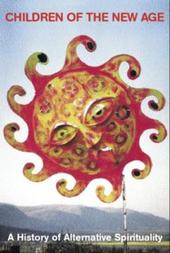
|
Children of the New Age: A History of Spiritual Practice
Hardback
Main Details
| Title |
Children of the New Age: A History of Spiritual Practice
|
| Authors and Contributors |
By (author) Steven Sutcliffe
|
| Physical Properties |
| Format:Hardback | | Pages:288 | | Dimensions(mm): Height 234,Width 156 |
|
| Category/Genre | Alternative belief systems
Mind, Body and Spirit |
|---|
| ISBN/Barcode |
9780415242981
|
| Classifications | Dewey:299.93 |
|---|
| Audience | |
|---|
| Illustrations |
bibliography
|
|
Publishing Details |
| Publisher |
Taylor & Francis Ltd
|
| Imprint |
Routledge
|
| Publication Date |
14 November 2002 |
| Publication Country |
United Kingdom
|
Description
Elements of New Age culture have emerged from the underground to become a central part of everyday life for many in the west. The demand for organic foods and natural remedies; the growing general interest in Wicca and the supernatural; the peace and anti-road lobbies and the burgeoning global rave scene are all influenced byt he variegated counterculture that New Age represents. But what exactly is New Age? How should we define its impact within the wider intellectual history of western culture? Children of the New Age , the first complete, up-to-date history of the New Age phenomenon, combines original ethnographic research and rare archival material to give a definitive overview of New Age belief and practice from the 1930s to the present day. It chronicles the development of alternative spirituality from embryonic beginnings to a universal trend: from its inception within the underground enclaves of Rosicrucians, occultists and Alice Bailey's neo-theosophists to its modern-day incusrions into mainstream political, musical and artistic culture. But this is also a distinctly critical history. New Age culture, says Steven S. Sutcliffe, is notoriously variegated and severely contested, party to competing strands of revelation and apocalypse. Caught between the hippy explosion and the terrifying doomsday scenarios of milennial Christianity and survivalist groups, it has been the preserve both of extreme, other-wordly religious individualists and of humanistic countercultures stressing the Edenic perfection of this-wordly existence. At stake in its history are controversial questions of value, and of its perceived status as a discrete and unified movement. What 'counts' as New Age? To whom does New Age culture belong? Is it now genuinely mainstream, or does its egalitarian, grass-roots, small-group ethos resist easy appropriation and succinct politicisation? Making special reference to first-hand accounts of the author's adventures in counterculture, including firewalking, spiritual healing workshops and life within a Findhorn community, and to archival correspondence and publications recovering the 'lost' history of alternative spirituality during the 1950s and 1960s, this is a thoughtful and colourful survey of the trends and controversies that accompany the concept of 'New Age'. It calls for a fresh understanding of New Age as an emergent and fragmented form of folk idiom, complete with its own revealing loyalties and fractures; not a unified 'movement' or 'new religion', but a diffuse cultural force reflecting ever-shifting currents of popular sentiment.
Author Biography
Steven Sutcliffe is affiliated to the University of Stirling. He is the author of numerous journal articles on the New Age and is the co-editor, with Marion Bowman, of Beyond the New Age.
Reviews"Steven J. Sutcliffe boldly takes on the task of sorting through the murk of imprecision that plauges New Age practices and discourse and, against all odds, manages to bring clarity to the subject.."-Theology Today
|